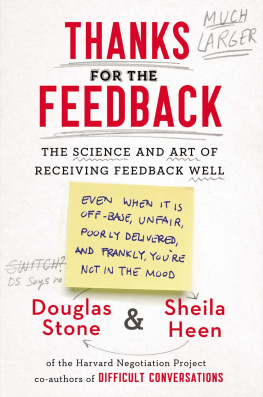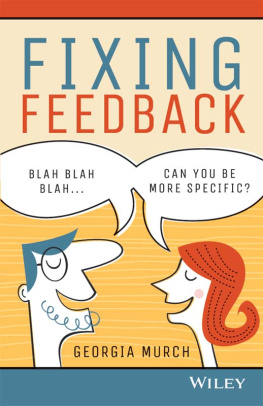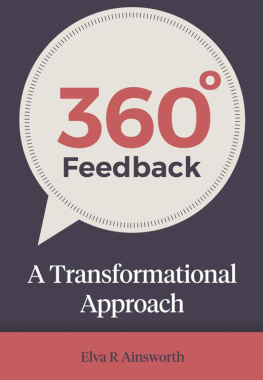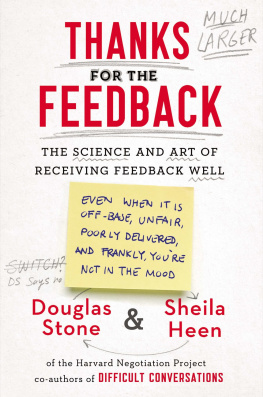ALSO BY DOUGLAS STONE & SHEILA HEEN
Difficult Conversations (with Bruce Patton)
VIKING
Published by the Penguin Group
Penguin Group (USA) LLC
375 Hudson Street
New York, New York 10014

USA | Canada | UK | Ireland | Australia | New Zealand | India | South Africa | China
penguin.com
A Penguin Random House Company
First published by Viking Penguin, a member of Penguin Group (USA) LLC, 2014
Copyright 2014 by Douglas Stone and Sheila Heen
Penguin supports copyright. Copyright fuels creativity, encourages diverse voices, promotes free speech, and creates a vibrant culture. Thank you for buying an authorized edition of this book and for complying with copyright laws by not reproducing, scanning, or distributing any part of it in any form without permission. You are supporting writers and allowing Penguin to continue to publish books for every reader.
Triple Self-Portrait by Norman Rockwell. Printed by permission of the Norman Rockwell Family Agency. Copyright 1960 the Norman Rockwell Family Entities.
LIBRARY OF CONGRESS CATALOGING-IN-PUBLICATION DATA
Stone, Douglas.
Thanks for the feedback : the science and art of receiving feedback well (even when it is off base, unfair, poorly delivered, and, frankly, youre not in the mood) / Douglas Stone, Sheila Heen.
pages cm
Includes bibliographical references and index.
ISBN 978-1-101-61427-3
1. Feedback (Psychology) 2. Interpersonal communication. I. Heen, Sheila. II. Title.
BF319.5.F4S76 2014
153.6'8dc23
2013036968
Graphs by Julie Munn
While the author has made every effort to provide accurate telephone numbers, Internet addresses, and other contact information at the time of publication, neither the publisher nor the author assumes any responsibility for errors, or for changes that occur after publication. Further, publisher does not have any control over and does not assume any responsibility for author or third-party Web sites or their content.
Version_1
To Anne and Don Stone,
the best parents in the world.
You taught me what matters.
ds
To John, Benjamin, Peter, and Adelaide,
for accepting me despite my flaws,
and even (occasionally) because of them.
sh
CONTENTS
INTRODUCTION
From Push to Pull
Before you tell me how to do it better, before you lay out your big plans for changing, fixing, and improving me, before you teach me how to pick myself up and dust myself off so that I can be shiny and successfulknow this: Ive heard it before.
Ive been graded, rated, and ranked. Coached, screened, and scored. Ive been picked first, picked last, and not picked at all. And that was just kindergarten.
We swim in an ocean of feedback.
Each year in the United States alone, every schoolchild will be handed back as many as 300 assignments, papers, and tests. Millions of kids will be assessed as they try out for a team or audition to be cast in a school play. Almost 2 million teenagers will receive SAT scores and face college verdicts thick and thin. At least 40 million people will be sizing up one another for love online, where 71 percent of them believe they can judge love at first sight. And now that we know each other... 250,000 weddings will be called off, and 877,000 spouses will file for divorce.
More feedback awaits at work. Twelve million people will lose a job and countless others will worry that they may be next. More than 500,000 entrepreneurs will open their doors for the first time, and almost 600,000 will shut theirs for the last. Thousands of other businesses will struggle to get by as debates proliferate in the boardroom and the back hall about why they are struggling. Feedback flies.
Did we mention performance reviews? Estimates suggest that between 50 and 90 percent of employees will receive performance reviews this
Margie receives a Meets Expectations, which sounds to her like Really, You Still Work Here?
Your second graders art project, Mommy Yells, was a hot topic at the schools Open House Night.
Your spouse has been complaining about your same character flaws for years. You think of this less as your spouse giving you feedback, and more as your spouse being annoying.
Rodrigo reads over his 360-degree feedback report. Repeatedly. He cant make head or tail of it, but one thing has changed: He now feels awkward with his colleagues, all 360 degrees of them.
Thanks for the Feedback is about the profound challenge of being on the receiving end of feedbackgood or bad, right or wrong, flippant, caring, or callous. This book is not a paean to improvement or a pep talk on how to make friends with your mistakes. There is encouragement here, but our primary purpose is to take an honest look at why receiving feedback is hard, and to provide a framework and some tools that can help you metabolize challenging, even crazy-making information and use it to fuel insight and growth.
In 1999, along with our friend and colleague Bruce Patton, we published Difficult Conversations: How to Discuss What Matters Most. Since then, weve continued to teach at Harvard Law School and to work with clients across continents, cultures, and industries. Weve had the privilege of working with an amazing assortment of people: executives, entrepreneurs, oil rig operators, doctors, nurses, teachers, scientists, engineers, religious leaders, police officers, filmmakers, lawyers, journalists, and relief workers. Even dance instructors and astronauts.
Heres something we noticed early on: When we ask people to list their most difficult conversations, feedback always comes up. It doesnt matter who they are, where they are, what they do, or why they brought us in. They describe just how tough it is to give honest feedback, even when they know its sorely needed. They tell us about performance problems that go unaddressed for years and explain that when they finally give the feedback, it rarely goes well. The coworker is upset and defensive, and ends up less motivated, not more. Given how hard it is to muster the courage and energy to give feedback in the first place, and the dispiriting resultswell, who needs it?
Eventually, someone in the group will pipe up to observe that getting feedback is often no easier. The feedback is unfair or off base. Its poorly timed and even more poorly delivered. And its not clear why the giver thinks they are qualified to offer an opinion; they may be the boss, but they dont really understand what we do or the constraints were under. We are left feeling underappreciated, demotivated, and more than a little indignant. Who needs it?
Interesting. When we give feedback, we notice that the receiver isnt good at receiving it. When we receive feedback, we notice that the giver isnt good at giving it.
We wondered: What is it that makes feedback such a conundrum for both givers and receivers? We started listening closely to people as they described their dilemmas, struggles, and triumphs, and noticed those same struggles in ourselves. As we worked to develop ways to approach feedback differently, we soon realized that the key player is not the giver, but the receiver. And we came to see how this could transform not just how we handle performance reviews on the job, but how we learn, lead, and behave in our professional roles and in our personal lives.















